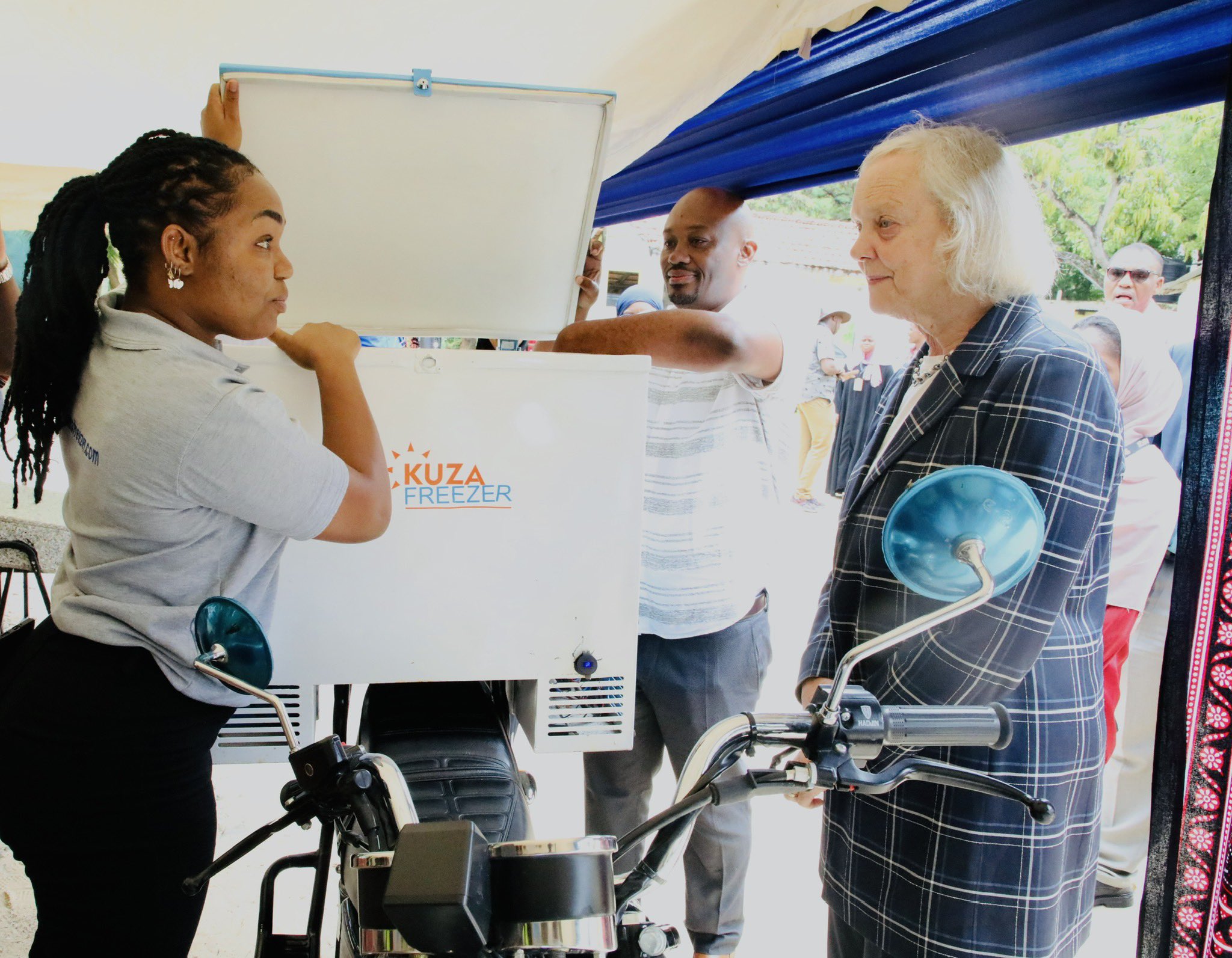CLIMATE CAPITAL
Post-Harvest Losses by 80% While Combating Environmental Challenges
Awards the company has won include the African Continental Free Trade Area (AFCFTA) caravan prize in 2021, Best Solar Power Solution in BlueInvest event held in Seychelles this September plus the Best Food Security Solution Provider in the connected summit 2022 held in Mombasa organized by Kenya’s Ministry of ICT, Innovation and Youth Affairs in collaboration with the Private sector.

Kenya’s small scale Fishers Find Solace in Solar Driven Freezer.
:Kuza Coolers Limited: Revolutionizing Mombasa’s Small-Scale Fisheries with Award-Winning Solar-Powered Freezers, Reducing
By Anne Ndungu
In Kenya’s north coast city of Mombasa sits the picturesque Bamburi beach with its ubiquitous fine soft sand stretching serenely as far as the eye can see, creating a palpable wedge with the calm bluish waters of the Indian ocean, the third largest body of water in the world, covering about 20% of the Earth’s water surface.
According to the World Wildlife Fund (WWF), the waters are home to some of the most important fisheries on Earth, accounting for over 14% of global wild-caught fish. Sadly though, 30% of assessed stocks are being fished beyond sustainable limits.
This is where the workshop of Kuza Coolers Limited (KCL), manufacturers of a continentally recognized award winning solar powered freezer, known as Kuza, that is ameliorating post harvest fish losses by 80 % for small scale fish harvesters annually is located.
Awards the company has won include the African Continental Free Trade Area (AFCFTA) caravan prize in 2021, Best Solar Power Solution in BlueInvest event held in Seychelles this September plus the Best Food Security Solution Provider in the connected summit 2022 held in Mombasa organized by Kenya’s Ministry of ICT, Innovation and Youth Affairs in collaboration with the Private sector.
“ We interacted with small-scale fishers here in Mombasa for over five years. And we got to understand that post-harvest losses due to lack of affordable cold storage services singularly was a core challenge. And we felt a sense of responsibility to bridge thecold-chain gap too improve the livelihoods of this fishing community,” says Dennis Onkangi, 32, C.E.O of KCL.
To date over 150 units are being used by over 350 small-scale fishers in Mombasa alone, says Onkangi adding that the freezer is also in demand in other parts of the country.
“ Raising capital is a major challenge to us to scale our manufacturing to meet the rising demands from rural fishers. We manufacture our products at small-scale and raise revenue from product sales to expand our business,” says Onkangi.
In 2007, the Kenya Government adopted Beach Management Units (BMUs) in fisheries management in collaboration with the Department of Fisheries to better manage fisheries stock.
But still fisheries management remains a challenge to the central government. When the project initially took off in 2020 Onkangi and his co-founder Purity Gakuo relied on crowdfunding, raising Ksh 250,000 (US$ 2,056) and including bootstrapping.
Coincidentally this 2018 computer science graduate of locally based Rongo University seemed wired prodigiously as his innovation streak was clearly noticeable while pursuing his undergrad, winning several national awards on behalf of the institution.
It’s also worth noting that somewhat if one is based in Mombasa, the probability of nurturing their innovation talent is likelier to succeed compared to other counties in Kenya.
With the city emerging as the second most preferred destination for start-ups after Nairobi, the capital, according to a 2021 report by StartupBlink Global Startup Ecosystem Index – the world’s most comprehensive startup ecosystem map and research center, working to uncover the momentum of startup ecosystems globally.
The Nigerian city of Lagos, according to the report, is the top African start-up ecosystem, followed by Nairobi.
The Kuza freezer saves the cost of energy by 70% annually and carries up to 150Kgs of load and extends the shelf life of fish harvest to over 30 days. Meet Oprah Atieno, 36, a fish vendor in Bamburi. She’s the breadwinner in her family and says before purchasing the Kuza freezer about 45 % of her fish went to waste daily.
In addition she would spend a lot of money buying ice to preserve her fish.
“ Today I am able to save money because I no longer depend on power from the grid to preserve my fish. With the money that I am saving I am able to send my children to school, keep some aside and to watch over my aging parents,” says Atieno.
Because the profile of small-scale fishing community is widely caricatured as one strapped for cash, KCL models its selling system against a pay-as-you-go payment arrangement, for the icebox whose one off price is Ksh 85,000 (US$ 703), making it arguably affordable to a sizable populace.
With the pay-as-you-go payment strategy a fisherman is required to part initially with Ksh 15,000 (US$ 124) followed by daily installments of Ksh 250 (US$ 2) running for 15 months to fully own the freezer. “ Our products are monitored remotely and important data such as temperature and location are collected to improve service quality,” says Onkangi.
Kenya’s fishing industry contributes about 0.5% of the national GDP and about 2% of the national export earnings. With the industry employing over 60,000 fishers directly and an estimated 1.2 million people indirectly, according to the Kenya Marine and Fisheries Research Institute (KMFRI), a state corporation that undertakes research in marine and freshwater fisheries here.
“ The main challenges facing Kenya’s fishery sector include environmental change and variability, invasive species, overfishing, declining stocks and post-harvest loss,” reads a 2020 report by KMFRI titled The status of Kenya Fisheries.
About 80% of the fish production in Kenya takes place in Lake Victoria, which supports the largest freshwater fishery in the world, producing 1 million tons of fish annually and employing 200,000 people in supporting the livelihoods of 4 million people.
“ Small-scale fisheries in Africa are important for the food security of more than 200 million people, and for the employment of around 2.3 million fishers targeting fisheries in the various marine, brackish and freshwater environments, “according to, Too Big To Ignore (TBTI), a global research network that addresses issues and concerns affecting viability and sustainability of small-scale fisheries.
According to Onkangi, food loss and waste contributes approximately 8% of the total man-made greenhouse gas (GHG) emissions.
“ Fish waste, if left to rot or is disposed of in landfill will generate methane gas and hence contribute to GHG emissions. Methane is a gas with 25 times more global warming potential than CO2.Our solution avoids food loss and waste (FLW) in fish value chains hence avoiding unnecessary GHG emissions and helping mitigate climate change,” says Onkangi, whose end game is to bridge the cold-chain Gap in the fish value chain in Sub-Saharan Africa.
Keywords:Kuza Coolers Limited:Solar-powered freezer:Small-scale fisheries:Fish post-harvest losses:Mombasa fishing community
Celebrities & Sports
Bien Aime Baraza: Kenya’s Top Spotify Artist of 2024
Bien’s music blends heartfelt lyrics with vibrant African rhythms, creating a powerful emotional connection with listeners. His hit single Inauma deeply resonated with fans, addressing themes of heartbreak and resilience, while showcasing his ability to craft compelling, introspective narratives. This track, like much of his work, blends raw emotion with the energy of African musical traditions, making it a standout in his catalog.

: Bien Aime Baraza, top Spotify artist in Kenya 2024, stands out with his soulful R&B sound and solo career success. Discover his journey and music evolution.
Bien-Aimé Baraza, widely known as Bien, has redefined the Kenyan music landscape with his soulful sound and captivating storytelling.
Crowned Spotify’s top artist in Kenya for 2024, his music spans genres, blending Afropop, R&B, and Afro-soul, making him a standout both locally and internationally.
EARLY CAREER AND RISE TO STARDOM
Bien’s music journey began at Upper Hill High School, where he formed Sauti Sol in 2006 with Savara Mudigi, Polycarp Otieno, and Willis Chimano.
The group initially sang a cappella before evolving into a multi-award-winning band. Reflecting on those formative years, Bien said, “We started as a bunch of boys who just loved to sing. We had no idea it would grow into this phenomenon”.
His passion for music was further nurtured during his studies at the United States International University, where he pursued Journalism and Media Studies.
His storytelling abilities became central to his lyrical style, characterised by emotive narratives and catchy melodies.
BREAKING AWAY FROM SAUTI SOL
In 2021, Bien began exploring solo projects while remaining part of Sauti Sol. In 2023, the band announced a “temporary separation,” explaining that they wanted to pursue individual growth.
Bien remarked, “This isn’t the end of Sauti Sol; it’s an opportunity to rediscover ourselves and bring something fresh to the table.” This independence allowed Bien to delve deeper into personal projects, which included collaborations like Bald Men Love Better with Aaron Rimbui.
MUSICAL STYLE AND LATEST PROJECTS
Bien’s music combines a mix of poignant lyrics and vibrant African rhythms. His hit single Inauma resonated deeply with fans, tackling heartbreak and resilience.
In 2024, his COLORSxSTUDIOS performance of True Love further showcased his ability to bring raw emotion and soul to his music. Speaking about his craft, he said, “Music is therapy for me; it’s how I make sense of the world and connect with my fans”
WHAT SETS BEIN APART
What makes Bien unique is his authenticity and ability to address universal themes while rooted in African culture. Unlike many local artists, Bien often experiments with sound and visuals, as seen in his COLORSxSTUDIOS performance.
His willingness to collaborate with international platforms and artists highlights his global vision for Kenyan music.
LEGACY AND IMPACT
Bien continues to inspire, proving that Kenyan artists can excel on the world stage. As Monica Kemoli-Savanne from Spotify noted, “Bien’s success is a testament to the power of African talent and storytelling”.
Whether with Sauti Sol or as a solo artist, Bien remains a force in music, bridging cultures and redefining the African sound for global audiences
Startups & Funding
Top 10 Richest East Africans Under 30: Industries & Net Worth

: Discover the top 10 wealthiest East Africans under 30, their industries,
achievements, and estimated net worths. Learn about their remarkable journeys
to success.”

Kenneth M. Njeru (25, Kenya)
- Engagement: Founder of Africa Afya Healthcare, focusing on healthcare investment services and IT solutions for healthcare access improvement.
- Industry: Healthtech and healthcare investment.
- Net Worth: Not publicly disclosed but prominent in healthcare financing in Kenya

Ayushi Chandaria (26, Kenya)
- Engagement: Founder of Design Thinking Program, fostering innovation in education.
- Industry: Education and innovation.
- Net Worth: Not publicly disclosed but recognized for her impactful work in Kenya

Alex Mativo (29, Kenya)
- Engagement: Co-founder of E-LAB, Nanasi, and Duck, leveraging technology in multiple sectors.
- Industry: Technology and entrepreneurship.
- Net Worth: Estimated at several million USD due to diversified ventures
- .

Prisca Wegesa Magori (29, Tanzania)
- Engagement: CEO and Co-founder of TenTen Explore and Smart EFD, providing innovative software solutions.
- Industry: Technology and software development.
- Net Worth: Undisclosed but influential in Tanzania’s tech scene

Andrew Ddembe (28, Uganda)
- Engagement: Co-founder and CEO of MobiKlinic, providing mobile-based healthcare solutions.
- Industry: Healthtech.
- Net Worth: Not disclosed but a key figure in Uganda’s health innovation

Arooj Sheikh (28, Kenya)
- Engagement: Founder and CEO of Beyond Kenyan Bars, working on social justice initiatives.
- Industry: Social entrepreneurship.
- Net Worth: Undisclosed, focusing on impactful social change
- .

Hildah Magaia (29, Tanzania/South Africa)
- Engagement: Professional footballer for Mazatlán FC and Tanzania’s national team.
- Industry: Sports.
- Net Worth: Significant from sports and endorsements

Chad Jones (28, Kenya/South Africa)
- Engagement: Social media influencer and brand ambassador.
- Industry: Digital media and marketing.
- Net Worth: Not disclosed but has significant brand partnerships
These individuals have demonstrated remarkable entrepreneurship and talent across East Africa, contributing to industries like health, technology, education, sports, and tourism.
CLIMATE CAPITAL
Access Bank Secures CAK Approval for National Bank Acquisition

: Access Bank to acquire National Bank of Kenya for $100M, boosting market
share to 1.9% with CAK approval and workforce retention conditions.
CAK Approves Access Bank’s Acquisition of NBK with Conditions
The Competition Authority of Kenya (CAK) approved Access Bank’s acquisition of the
National Bank of Kenya (NBK) from KCB Group, requiring Access Bank to retain 80% of
NBK’s workforce for at least one year.
The Central Bank of Kenya (CBK) must now give its final approval for the deal.
Employment Retention Key to Approval
According to CAK, Access Bank must maintain 80% of NBK’s 1,384 employees and all
316 staff from its local subsidiary, Access Bank Kenya, for a year following the
transaction’s completion. “The transaction has been approved on condition that Access
Bank Plc retains, for one year, at least 80% of the target’s current workforce,” CAK
stated.
Deal Valuation and Finalization Timeline
While the deal’s value has not been disclosed, KCB Group announced in March 2024
that NBK would be sold for 1.25 times its book value. With NBK’s 2023 book value at
$79.77 million, the acquisition is estimated to be worth approximately $100 million. The
transaction is expected to conclude in November.
Expanding Access Bank’s Kenyan Presence
Access Bank’s current footprint in Kenya includes 23 branches in 12 counties. Acquiring
NBK’s 77 branches across 28 counties will significantly boost its presence and service
offerings, including retail, corporate, and Islamic banking. Access Bank, currently
ranked as a tier 3 lender, will integrate with NBK, a tier 2 institution, enhancing its status
in the market.
Market Share and Competition Analysis
The acquisition will give the merged entity a 1.9% market share in Kenya’s banking
sector. “The combined market size is unlikely to raise competition concerns since it is
low,” CAK noted. “The merged entity will face competition from other banks in the
market. Based on this, the transaction is unlikely to substantially lessen or prevent
competition.”
-

 Business & Money10 months ago
Business & Money10 months agoEquity Group Announces Kshs 15.1 Billion Dividend Amid Strong Performance
-

 Politics4 months ago
Politics4 months agoFred Okengo Matiang’i vs. President William Ruto: A 2027 Election Showdown
-

 Politics3 months ago
Politics3 months agoIchung’wah Faces Mt. Kenya Backlash Over Gachagua Impeachment Support
-

 Politics6 months ago
Politics6 months agoPresident Ruto’s Bold Cabinet Dismissal Sparks Hope for Change
-

 Politics6 months ago
Politics6 months agoKenya Grapples with Investor Confidence Crisis Amid Tax Protest Fallout
-

 Politics6 months ago
Politics6 months agoPresident Ruto’s Lavish Spending Amid Kenya’s Economic Struggles Sparks Outrage
-

 Politics5 months ago
Politics5 months agoJohn Mbadi Takes Over Kenya’s Treasury: Challenges Ahead
-

 Business & Money2 months ago
Business & Money2 months agoMeet Kariuki Ngari: Standard Chartered Bank’s new CEO of Africa. What’s Next?





